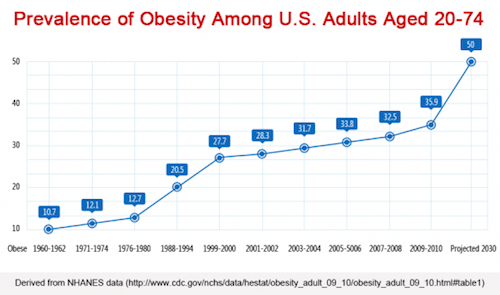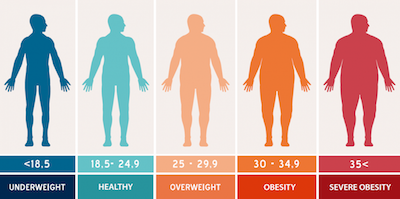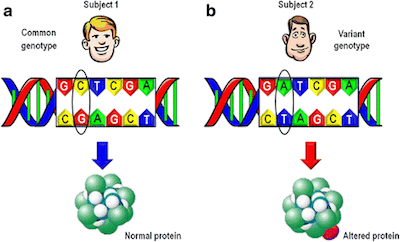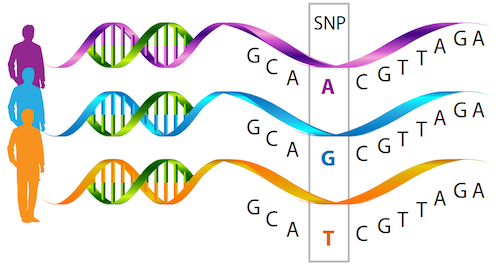Can Diets Tailored To Our Genetics Help With Weight Loss? (Drew’s Digest #11)

The spread of obesity has snowballed over the past half-century. In 2014, the global prevalence of overweight and obese adults reached 39% and 13%, respectively - and there is no end in sight. Some experts go as far as estimating that over 50% of the adult population will be classified as obese by 2030.

source
Overweight and obesity is determined by calculating a persons BMI or body mass index (a universal measurement using height and weight).

source
This is a simple tool that can be used as a guide to quickly determine whether someone is considered obese (i.e. if their BMI is above 30). It should be noted, however, that this is not always an accurate representation of a person's physical state and is a basic guide for most of the population; bodybuilders, for example, may have a higher BMI due to having more muscle mass.

source
You can check out your BMI here.
Traditional weight loss interventions
To combat obesity, dietary changes for individuals are typically modelled around caloric restriction or adjustment of their current macronutrient proportions (In short, eating less and being more mindful of food choices). However, this method of managing body weight can often be a ‘one size fits all’ approach and may not work for everyone.
An often overlooked variable to the cause of obesity is genetics. It is estimated that around 25 to 70% of the variations in our bodies are influenced by genetics. Research in this area has soared over the past decade and`revealed that there are more than 100 genes have are linked to obesity or the management of body weight .
Nutrigenetics
Research into how our genetic variations can affect the way our bodies respond or process different nutrients.

source
These genetic associations are identified using either a candidate gene approach or via a genome-wide association study (GWAS).
Candidate genes are identified directly from the relationship of a certain disease and a specific genetic variant.
GWAS provide a way of determining which genes or polymorphisms are likely to be related to obesity (e.g. by identifying common genetic variations within a population of of people with different BMIs).
In 2005, the Human Obesity Gene Map was produced providing an exhaustive reference point for research about the hundreds of genes and polymorphisms that are linked to body weight, metabolic functions, the gene-gut axis, hormone regulation, appetite and even behaviour.
Single nucleotide polymorphisms (or SNPs) are variations within a gene, which exist as two or more possible alleles. SNPs are commonly examined in gene-diet studies within obese populations, allowing researchers to identify whether the risk alleles that are linked to obesity will respond to different dietary interventions.

source
In 2015, a systematic review looked at whether diets that were personalised to suit people based on their particular obesity-related SNPs could be effective. The review found that some diets did have positive results for weight loss, but to date few replicated studies have been performed to generate conclusive results - and there are a lot of genes and diets to test. Research takes time.
One particularly famous genes (out of the 100’s) in this area of study is FTO (shortened from “fat mass and obesity associated protein”). It was the first locus that was discovered (using GWAS) to be associated with BMI and has remained a staple reference point for obesity genetics research.
Conclusion
There is certainly plenty of evidence to suggest that genetic variations have a role in how our bodies process and interact with food. But we are still a long way off from getting some solid answers about the best method for targeting overweight and obesity - especially in patients that are unsuccessful in managing their weight via conventional caloric restriction and macronutrient-focused approaches. No two people are the same and therefore diets should be individualised as much as possible to suit each person's specific situation.

Images are my own, sourced from Pixabay or linked
My Latest Articles
Printable Diets: How Soon Will We Have 3D Foods?
Feeding The Gut: Are We Really In Control?
An A-Z guide to vegan staples | Never go hungry with these foods 🥑
Asparagus! The Food of Gods? Kings? Or Wizards? 👑
Everything You Ever Need To Know About Coriander 🌱
My Latest Recipes
Toasted Avocado and Enoki Mushroom Sandwich | My Favourite Vegan Lunch
CONNECT WITH ME ON

I do think personalised medicine has a great future, but I do think it's a while off. Just getting patients to comply with the basics is tough enough and that's the first step.
Still a really great post, thanks :)
You got a 18.24% upvote from @minnowvotes courtesy of @thedrewtrott!
This post has received a 31.89% upvote from @msp-bidbot thanks to: @thedrewtrott. Delegate SP to this public bot and get paid daily: 50SP, 100SP, 250SP, 500SP, 1000SP, 5000SP Don't delegate so much that you have less than 50SP left on your account.
Sneaky Ninja Attack! You have been defended with a 2.31% vote... I was summoned by @thedrewtrott! I have done their bidding and now I will vanish...Whoosh
It's a complicated system. I think gut bacteria has a huge role which is really controlled by diet. This is also the reason why diets are insanely hard to change. Changing your diet destabilizes the symbiotic relationship of your gut biome which has some consequences.
If genetics had much of a role in obesity, then white Europeans and white Americans would have about the same obesity rates. Obesity is caused by food and exercise. Anyone can keep themselves from being obese.
That's a good point and it may be preventable in a lot of instances, but there are still some that ,despite after best efforts and multiple dietary intervention, cannot control their weight gain. This is where genetics may provide an alternative method of treatment.